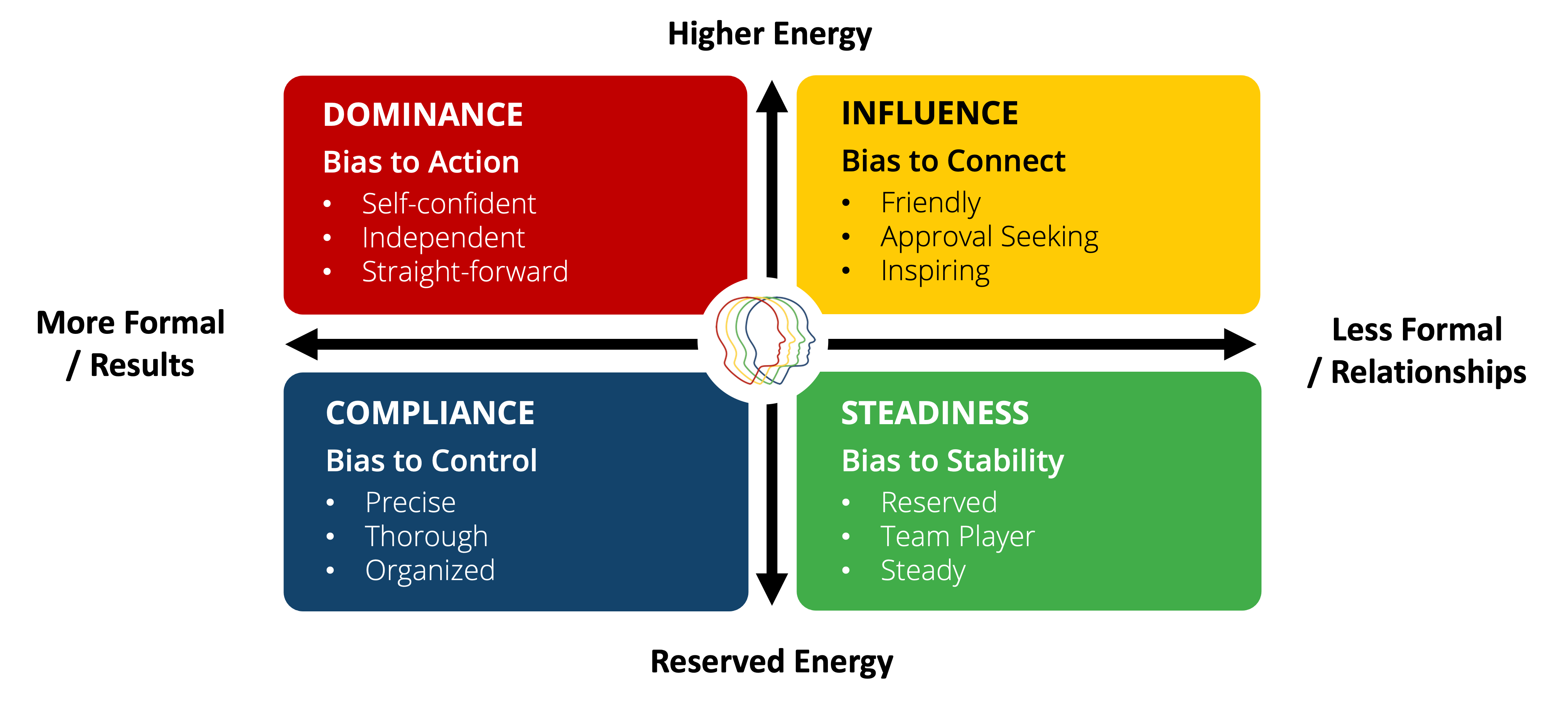Companies spend an enormous amount of money trying to motivate, inspire, and essentially change their employees. In 2021, self-improvement was a $10.4 billion industry. (source)
It’s been said, however, that people will always do exactly what people want to do.
That’s true when times are good and it’s true when times are bad (or challenging—like they are at the time of this writing).
So how do you as a hiring manager or sales leader know that you’ve got the right people in the right roles? The answer is: personal assessments.
Personal assessments reveal the motivators and behavior styles that really affect how well someone will perform in a position, although not all tests provide reliable information (nor are they all legal to use in hiring decisions).
Personality vs. behavior
When considering a “personality test” in hiring, it’s important to note the difference between personality and behavior. Personality is essentially what a person is thinking or feeling, while behavior is what a person actually does. Since any job is a collection of tasks that need to be accomplished, it’s important to know what people will actually do, despite how they feel.
For this reason, we favor the DiSC® personal assessment tool. It helps people identify their blend of four behavioral styles between high energy vs. low energy, and results-driven vs. relationship-driven.

Here’s a high-level overview of each style:
- Dominance: “Doers” have fast-paced speech and a strong personality. They’re direct, controlling, dress to impress, walk fast, set big goals, and are comfortable with change. They buy new and unique products and make decisions quickly.
- Influence: “Talkers” are friendly, talkative, and love hand gestures. They’re easily (and happily) distracted so meetings often run late. They wear contemporary, stylish clothes, and fill their office with memorabilia of past experiences. They buy trendy or showy products impulsively.
- Steadiness: “Pacers” are easy-going and patient. They’re reserved, deliberate, and don’t speak with emotion. They walk and move at a relaxed pace, and do not like change. They dress in casual, comfortable clothes, and prefer low-risk, short-term goals. They buy traditional products and are slow decision-makers.
- Compliance: “Controllers” speak slowly and deliberately. They ask questions about facts and data. Being naturally skeptical and suspicious, they are concerned about the effects of change. They dress meticulously, are good at setting multiple goals, and prefer non-fiction books. They are slow decision-makers who buy proven products.
Using DiSC® to write better job descriptions
It’s important to match people’s behavior styles with the work you need them to do. A typical job description attempts to do this by rattling off qualifications and responsibilities, which is fitting given the “high compliance” communication style usually held by the people naturally attracted to HR positions.
However, you can spruce up your job descriptions by using characteristics of the person you’re looking for. If you want to hire a “doer”, say things like “successful people in this role describe themselves as fast-paced, direct, and comfortable with change.”
Not only will it attract the right kind of applicants, but it will also repel the wrong ones.
Using DiSC® assessments for hiring
Assessments can help you predict a candidate’s likelihood of success in your organization, but not all assessment tools are legally eligible for hiring purposes.
The Brooks Talent Index assessment exceeds all federal and ethical guidelines for employment testing. Many popular personality tests such as the Myers-Briggs Type Indicator have useful applications within the workplace but aren’t legal for making hiring decisions.
Can people change?
After reviewing the results of an assessment people often ask us “can I change?” It’s important to note here that no assessment is meant to put people into a box, nor give them an excuse for their behavior. People can always change, although that change is often difficult, and slow.
Think of any habit you’ve tried to change. Was it easy? Probably not. Now imagine that you tried to change the entirety of your natural, life-long behavior style, instead of just a habit. Again, it’s not impossible, but would be difficult, to say the least.
Sometimes people don’t need “to change”, but simply need training in a specific area. Knowledge of the DiSC® behavior styles itself will help improve sales because a salesperson who can adjust their behavior and communication style to match that of their buyer is more likely to be successful than one who can’t.
Right person, wrong role
What if you find yourself with an employee who is a good person but just doesn’t seem to be right for the role they’re in?
First, this should alert you to the fact that your normal hiring process which likely involves interviews, references, and résumés might not be enough.
Second, don’t despair! See if you can adjust their responsibilities so it more naturally fits their behavior style. It’s better to find good people a better place in your organization than lose them (and their inner-working knowledge of your company) to the competition.
Accurate, tested, and proven
The Brooks Talent Index combines four assessments which are highly accurate at predicting behavior.
> DiSC® behavior assessment
> Driving forces assessment
> Competencies analysis
> Acumen report
These validated assessments help you build a stronger team and reduce turnover by ensuring you put the right people in the right roles.



